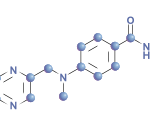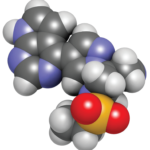At the November 2012 ACR/ARHP Annual Meeting, the ORAL phase III studies for RA as well as long-term extensions were summarized in terms of efficacy and safety for both 5-mg and 10-mg p.o. b.i.d. dose schedules.4 The FDA only approved the 5-mg p.o. b.i.d. dose. Pooling data from approximately 3,300 RA patients comprising five different ORAL studies on tofacitinib treatment in RA, an ACR 20/50/70 response of 74.6%, 49.3%, and 32.8%, respectively, was observed, with 17.9% of these achieving a Disease Activity Score–defined remission. Within this population, 53.1% of patients failing two prior tumor necrosis factor (TNF) inhibitors achieved an ACR 20 response.5
The 12-month data from the ORAL START phase III trial were presented, evaluating a cohort of 958 MTX-naive patients receiving tofacitinib as monotherapy or MTX titration. Initial 12-month data are intriguing, as they demonstrated significant improvement in symptoms, physical function, and retarded radiographic progression compared to the MTX arm.6 Longer studies will be needed to see if this trend is maintained with similar safety as MTX.
Safety analyses of pooled data of tofacitinib-treated patients show a similar serious infection rate to biologics of 2.7/100 patient-years with opportunistic infections including tuberculosis, fungal infections, and pneumocystis reported. Screening for latent tuberculosis is recommended. The frequency of serious infections was increased in patients over the age of 65. In long-term extensions, a slightly higher rate of infections and nonmelanoma skin cancers was seen in the 10-mg p.o. b.i.d. studies, and this dose was therefore not approved by the FDA. However, a higher incidence ratio (4.5) of herpes zoster was seen compared to other biologics (1.32).7 There was no association with neutropenia, lymphopenia, or concomitant nonbiologic DMARDs. No safety data are available on impact of tofacitinib on patients with chronic viral hepatitis reactivation, as these patients were excluded from the trials. Prophylactic vaccination for herpes zoster and hepatitis B should be updated prior to treatment whenever possible, and live virus vaccination during treatment should be avoided.
Malignancies including lymphoma have been reported in conjunction with treatment with tofacitinib, and Epstein-Barr virus lymphoproliferative disorders were seen in renal transplant studies.
GI perforations occurred in 10 of 5,043 tofacitinib-treated patients in analysis of pooled study data from ORAL trials with long-term extensions resulting in 0.144 events per 100 patient-years. Six of these cases were diverticular in nature, three were appendiceal perforations, and one an isolated gastric ulcer.
Laboratory-test monitoring should include initially a complete blood count (CBC), comprehensive metabolic panel (CMP), and fasting lipid panel. Minor decreases in absolute lymphocyte, neutrophil, and red blood cell counts were seen in less than 1% of patients. Transaminitis was also reported, which usually responded to a reduction in dose or discontinuation of therapy with only 0.5% reaching three times the upper limit of normal on the 5-mg p.o. b.i.d. A dose-response change in creatinine (mean <0.1 mg/dl) was seen, which generally peaked at six weeks and then plateaued with a return to baseline four to six weeks after discontinuation. However, in long-term extensions, discontinuation of therapy only occurred due to renal insufficiency in 0.4% of patients in the 5-mg b.i.d. studies. The cause of this change is not understood. Mean LDL cholesterol increased by 15% and mean HDL increase by 10% with no change in LDL/HDL ratio. This effect was generally present within six weeks. A repeat fasting lipid panel is recommended at two to three months of therapy. Initial monitoring of CBC and CMP monthly for the first three months and then every two to three months thereafter would be prudent as this agent is used in larger, more heterogeneous patient populations.


